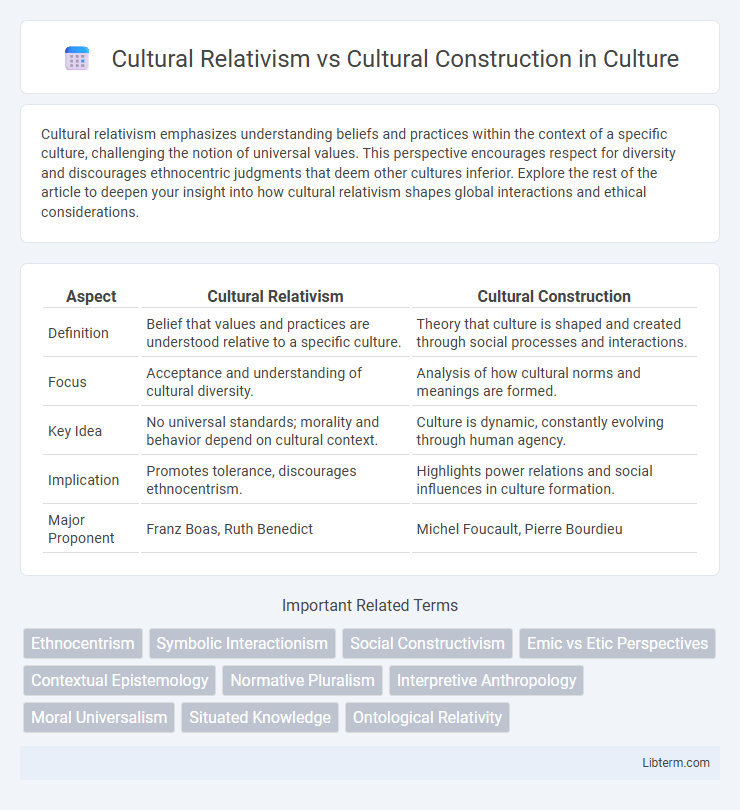Cultural relativism emphasizes understanding beliefs and practices within the context of a specific culture, challenging the notion of universal values. This perspective encourages respect for diversity and discourages ethnocentric judgments that deem other cultures inferior. Explore the rest of the article to deepen your insight into how cultural relativism shapes global interactions and ethical considerations.
Table of Comparison
| Aspect | Cultural Relativism | Cultural Construction |
|---|---|---|
| Definition | Belief that values and practices are understood relative to a specific culture. | Theory that culture is shaped and created through social processes and interactions. |
| Focus | Acceptance and understanding of cultural diversity. | Analysis of how cultural norms and meanings are formed. |
| Key Idea | No universal standards; morality and behavior depend on cultural context. | Culture is dynamic, constantly evolving through human agency. |
| Implication | Promotes tolerance, discourages ethnocentrism. | Highlights power relations and social influences in culture formation. |
| Major Proponent | Franz Boas, Ruth Benedict | Michel Foucault, Pierre Bourdieu |
Understanding Cultural Relativism
Cultural relativism emphasizes understanding beliefs, values, and practices within the context of a specific culture, avoiding ethnocentric judgments. It asserts that moral and ethical systems are culturally bound and not universally applicable, promoting empathy and tolerance. This perspective contrasts with cultural construction theories, which focus on how cultures actively create social realities through shared meanings and practices.
Defining Cultural Construction
Cultural construction refers to the process by which societies create and assign meaning to norms, values, and social realities through collective beliefs and practices. It emphasizes that what is considered normal or true is shaped by historical, social, and environmental contexts rather than existing as objective facts. This concept contrasts with cultural relativism by highlighting how cultural meanings are actively produced and negotiated rather than merely observed or tolerated.
Historical Origins of Both Concepts
Cultural relativism emerged in the early 20th century, prominently shaped by Franz Boas, who challenged ethnocentric views by emphasizing the importance of understanding cultures within their own historical contexts. Cultural construction theory, rooted in mid-20th-century sociology and anthropology, draws from the works of social theorists like Berger and Luckmann, highlighting how social realities, including culture, are continuously created and maintained through collective human interactions. Both concepts diverge historically, with cultural relativism focusing on ethical and methodological respect for cultural difference, while cultural construction emphasizes the dynamic and fluid nature of cultural meanings shaped by social processes.
Key Differences Between Relativism and Construction
Cultural relativism asserts that beliefs and practices should be understood based on a culture's own context, emphasizing moral and epistemological tolerance without universal judgments. Cultural construction views culture as dynamically created through social processes, highlighting how identities, meanings, and norms are actively shaped rather than fixed. The key difference lies in relativism's focus on contextual acceptance versus construction's emphasis on the ongoing formation and negotiation of cultural realities.
Examples of Cultural Relativism in Practice
Cultural relativism is exemplified in practices such as the diverse marriage customs observed worldwide, where polygamy is accepted in certain African cultures but prohibited in Western societies, highlighting the importance of understanding cultural norms within their specific contexts. Another example includes dietary restrictions, like the Hindu taboo against beef consumption, which is respected through a relativist lens that refrains from imposing external judgments. These instances demonstrate how cultural relativism promotes tolerance and prevents ethnocentric bias by interpreting cultural practices on their own terms.
Case Studies Illustrating Cultural Construction
Case studies illustrating cultural construction often highlight how social norms and identities are shaped by historical and environmental contexts rather than inherent cultural traits. For example, gender roles in the Kavango society of Namibia demonstrate that what might be perceived as natural behaviors are actually constructed through social practices and rituals unique to that community. Similarly, the Anlo Ewe people of Ghana show how language, ceremonies, and kinship ties actively construct cultural meanings, challenging the idea of static, universally fixed cultural attributes.
Impact on Social Norms and Values
Cultural relativism emphasizes understanding social norms and values within their specific cultural contexts, promoting tolerance and reducing ethnocentric judgments. In contrast, cultural construction highlights how social norms and values are actively created and negotiated through interactions, power dynamics, and historical processes. This approach reveals the fluidity of norms, showing that values can evolve and change depending on social influences and collective meaning-making.
Debates in Contemporary Anthropology
Debates in contemporary anthropology often revolve around cultural relativism, which emphasizes understanding cultures on their own terms, versus cultural construction, which argues that cultural meanings and social realities are actively produced through human interaction. Scholars critique cultural relativism for potentially endorsing moral relativism, while supporters of cultural construction highlight the fluidity and negotiated nature of identity, power, and norms within societies. These debates shape methodological approaches and ethical considerations in ethnographic research, influencing how anthropologists interpret cultural diversity and social change.
Criticisms and Controversies
Criticisms of cultural relativism highlight its potential to justify harmful practices by defending all cultural norms as equally valid, risking moral paralysis and ethical inconsistency. Cultural construction faces controversies for sometimes overlooking material and biological factors, arguing that all social realities and identities are solely shaped through language, norms, and power structures. Both perspectives provoke debate over balancing respect for cultural diversity with universal human rights and objective ethical standards.
The Future of Cultural Analysis
The future of cultural analysis hinges on integrating insights from cultural relativism and cultural construction, fostering a nuanced understanding of identity and social norms as fluid and context-dependent. Emerging methodologies emphasize the dynamic interplay between cultural narratives and individual agency, allowing for more inclusive and adaptive interpretations. Advances in digital ethnography and interdisciplinary frameworks will further refine the capacity to analyze evolving cultural phenomena across globalized contexts.
Cultural Relativism Infographic

 libterm.com
libterm.com